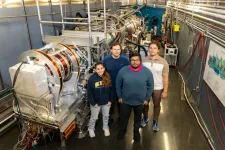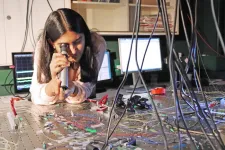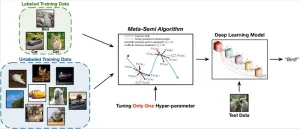(Press-News.org) One in 10 adults suffer from the debilitating effects of chronic obstructive pulmonary disease (COPD). Research around a new breathing device developed by pulmonologists at the University of Cincinnati offers promise for improving their lives.
The new device not only improves symptoms of breathlessness and quality of life for people with COPD, it also offers benefits for people dealing with stress and anxiety and those practicing mindfulness, meditation or yoga.
The research was published in the journal Respiratory Care.
The device, called PEP Buddy, was created by Muhammad Ahsan Zafar, MD, and Ralph Panos, MD. Zafar is an associate professor in the Department of Pulmonary Critical Care and Sleep Medicine at the UC College of Medicine while Panos is a professor emeritus in pulmonary and critical care at the UC College of Medicine and is the director of national tele-ICU program for the U.S. Veterans Affairs.
“Dr. Panos and I both see patients with COPD, and it’s a huge population,” says Zafar. “Their life really changes when they have COPD. They were active individuals but now they’re debilitated and limited, so we wanted to come up with something easy that helps improve their life.”
For people with COPD, it takes longer to get inhaled air out of their lungs with each breath due to tighter air tubes. Therefore, when they breathe fast, like during physical activities, air is retained in the lungs. This air stacking or “dynamic hyperinflation” is the main reason for breathlessness and also leads to lower oxygen levels. As the breathing gets difficult during physical activity, people become less and less active and more isolated.
Panos and Zafar developed a hands-free device that is the size of a whistle. Zafar said he looked at positive-expiratory pressure (PEP) breathing devices on the market and they were handheld, big and bulky, so they tried to come up with something that is very simple, lightweight and easy to use. The device is designed to be worn around the neck with a lanyard for day-to-day use and inserted into the mouth when needed, during or after exertion.
In the study, they examined people with COPD who were short of breath and gave them two tasks. “We conducted a six-minute walk test with and without the device,” says Zafar. “They were given the device to take home and use in their daily routines. In two weeks, there was a follow-up to see how PEP Buddy use impacted their shortness of breath and quality-of-life scores.”
The study found 72% of the participants had a significant impact in reducing their shortness of breath and improving their quality of life. Among those who would drop their oxygen levels during walking, 36% of them did not drop oxygen levels when using PEP Buddy. This is the first mechanical device to show such an impact on oxygen levels in people with COPD.
Maja Flannery, a PEP Buddy user with chronic lung disease and airflow obstruction, says the device has changed her day-to-day living.
“I am so happy that I was lucky enough to be part of the study and able to use this great little device to breathe better,” Flannery says. “I use it when I get up in the morning. It helps with the air requirement when changing position from laying down to standing and exercises my lungs to get them more prepared for the day. I find it helpful in getting the trapped air out as I am active, so I can play longer points during tennis, and also recover between points more quickly. My friends at tennis laugh that it is my ‘magic whistle.’”
UC’s Zafar says the next step in this research is to conduct a long-term study to see the impact on the use of rescue inhalers, emergency department visits and long-term symptoms and functional capacity in people with COPD. PEP Buddy may also be a promising addition to pulmonary rehabilitation programs for faster improvement and sustaining better outcomes. They are also exploring other uses of PEP Buddy in health care.
“As a physician I feel gratified that we are providing something new that can actually improve people’s lives,” says Zafar. “That’s where my passion is. These people are really debilitated with not many tools in their hand to improve their symptoms right now. PEP Buddy will be one such tool.”
END
University of Cincinnati researchers develop innovative breathing aid
Hands-free device improves breathing in people with COPD
2023-03-10
ELSE PRESS RELEASES FROM THIS DATE:
Insurance status and race, ethnicity inequities in the diagnosis of advanced cervical cancer
2023-03-10
About The Study: The findings of this study of nearly 24,000 individuals suggest that insurance is a modifiable risk factor that plays an important role in the racial and ethnic inequities observed in the diagnosis of advanced-stage cervical cancer. Expanding access to care and improving the quality of services rendered for uninsured patients and those covered by Medicaid may mitigate the known inequities in cervical cancer diagnosis and related outcomes.
Authors: Hunter K. Holt, M.D., M.A.S., of the University of Illinois at Chicago, is the corresponding author.
To access the embargoed study: Visit our For The Media ...
Association of primary care visit length with potentially inappropriate prescribing
2023-03-10
About The Study: In this study of 4.3 million patients, those who were younger, publicly insured, Hispanic, or non-Hispanic Black had shorter primary care physician visits. Shorter visits were associated with a higher likelihood of inappropriate antibiotic prescribing for patients with upper respiratory tract infections and co-prescribing of opioids and benzodiazepines for patients with painful conditions. These findings suggest opportunities for additional research and operational improvements to visit scheduling and quality of prescribing decisions ...
Neutrons reveal how the spider lily preys on cancer, preserves healthy cells
2023-03-10
A scientific instrument at the Department of Energy’s Oak Ridge National Laboratory could help create a noninvasive cancer treatment derived from a common tropical plant.
Pancratistatin is a chemical compound found in the spider lily, a native Hawaiian flower. Unlike traditional treatments, it kills cancer cells while keeping healthy cells intact.
Until recently, pancratistatin’s workings have mystified scientists, clouding hope for potential new treatments. But after conducting neutron experiments at ORNL, students from the University of Windsor have ...
Migratory birds take breaks to boost their immune system
2023-03-10
Exercising too much and not getting enough rest is bad for your health. A new study from Lund University in Sweden shows that the same is true for migratory birds. They need to rest not only to renew their energy levels but also in order to boost their immune system.
After a period of physical exertion, vertebrates, including humans, usually need a period of recovery. Apart from the obvious – lowering the heart rate and repairing injured muscles – other, less prominent physiological systems might also need to recover. Intensive physical activity can affect an individual’s basic immune defence.
When birds migrate, they regularly stop in one place for a ...
Hotter than infinity – light pulses can behave like an exotic gas
2023-03-10
In the issue of the renowned journal Science published today (10.3.23), the team led by Prof. Dr Ulf Peschel reports on measurements on a sequence of pulses that travel thousands of kilometres through glass fibres that are only a few microns thin. The researchers were surprised by the results. “We have found that the light pulses organize themselves after about a hundred kilometres and then behave more like molecules of a conventional gas, such as air, for example”, reports Prof. Ulf Peschel, the head of the group in Jena. In a gas the particles move back ...
Cause of leukemia in trisomy 21
2023-03-10
FRANKFURT. Leukaemia (blood cancer) is a group of malignant and aggressive diseases of the blood-forming cells in the bone marrow. Very intensive chemotherapy and in some cases a bone marrow transplant are the only cure. Like all cancers, leukaemia is caused by changes in the DNA, the heredity material present in human cells in the form of 46 chromosomes. In many forms of leukaemia, large parts of these chromosomes are altered. People with Down syndrome, who have three copies of chromosome 21 (trisomy 21) are highly vulnerable: ...
A study analyzes the notion of spectacle through the figure of Antigone
2023-03-10
A research study at Universidad Carlos III de Madrid (UC3M) analyzes the notion of spectacle as an enunciative space that is located beyond mediatic logic. In contrast to the generalized concept of spectacle laden with negative connotations, the study proposes a distancing of that concept from that of entertainment. UC3M Full Professor Pilar Carrera, in her essay Antígona o la razón espectacular (2023), published in the review Signa,advocates the notion of spectacle from the perspective of spectacular distance ...
Outperforms state-of-the-art algorithms in deep learning tasks
2023-03-10
Deep learning based semi-supervised learning algorithms have shown promising results in recent years. However, they are not yet practical in real semi-supervised learning scenarios, such as medical image processing, hyper-spectral image classification, network traffic recognition, and document recognition. In these types of scenarios, the labeled data is scarce for hyper-parameter search, because they introduce multiple tunable hyper-parameters. A research team has proposed a novel meta-learning based semi-supervised learning algorithm called Meta-Semi, that requires tuning only one additional hyper-parameter. Their Meta-Semi approach outperforms state-of-the-art ...
Social intelligence is the next frontier for AI, researchers say
2023-03-10
Siri and Google Assistant may be able to schedule meetings on request, but they don’t have the social understanding to independently prioritize the appointments — yet. According to researchers based in China, artificial intelligence (AI) may be smart, but it is stunted by a lack of social skills.
They published their review of the current state and call for future directions on March 10 in CAAI Artificial Intelligence Research.
“Artificial intelligence has changed our society and our daily life,” said first author Lifeng Fan, National Key Laboratory of General Artificial Intelligence, Beijing Institute for General Artificial ...
$3 million grant backs international effort to help children live healthier lives
2023-03-10
An international team of researchers has received $3 million to support an ambitious effort to understand how early gut development can profoundly shape children’s health throughout life.
The funding from the Chan Zuckerberg Initiative will allow scientists at the University of Virginia School of Medicine, Boston Children’s Hospital, University of Mississippi Medical Center and Pakistan’s Aga Khan University to “map” the healthy gut in children ages 5 and younger down to the ...
LAST 30 PRESS RELEASES:
COVID-19 vaccination during pregnancy may help prevent preeclampsia
Menopausal hormone therapy not linked to increased risk of death
Chronic shortage of family doctors in England, reveals BMJ analysis
Booster jabs reduce the risks of COVID-19 deaths, study finds
Screening increases survival rate for stage IV breast cancer by 60%
ACC announces inaugural fellow for the Thad and Gerry Waites Rural Cardiovascular Research Fellowship
University of Oklahoma researchers develop durable hybrid materials for faster radiation detection
Medicaid disenrollment spikes at age 19, study finds
Turning agricultural waste into advanced materials: Review highlights how torrefaction could power a sustainable carbon future
New study warns emerging pollutants in livestock and aquaculture waste may threaten ecosystems and public health
Integrated rice–aquatic farming systems may hold the key to smarter nitrogen use and lower agricultural emissions
Hope for global banana farming in genetic discovery
Mirror image pheromones help beetles swipe right
Prenatal lead exposure related to worse cognitive function in adults
Research alert: Understanding substance use across the full spectrum of sexual identity
Pekingese, Shih Tzu and Staffordshire Bull Terrier among twelve dog breeds at risk of serious breathing condition
Selected dog breeds with most breathing trouble identified in new study
Interplay of class and gender may influence social judgments differently between cultures
Pollen counts can be predicted by machine learning models using meteorological data with more than 80% accuracy even a week ahead, for both grass and birch tree pollen, which could be key in effective
Rewriting our understanding of early hominin dispersal to Eurasia
Rising simultaneous wildfire risk compromises international firefighting efforts
Honey bee "dance floors" can be accurately located with a new method, mapping where in the hive forager bees perform waggle dances to signal the location of pollen and nectar for their nestmates
Exercise and nutritional drinks can reduce the need for care in dementia
Michelson Medical Research Foundation awards $750,000 to rising immunology leaders
SfN announces Early Career Policy Ambassadors Class of 2026
Spiritual practices strongly associated with reduced risk for hazardous alcohol and drug use
Novel vaccine protects against C. diff disease and recurrence
An “electrical” circadian clock balances growth between shoots and roots
Largest study of rare skin cancer in Mexican patients shows its more complex than previously thought
Colonists dredged away Sydney’s natural oyster reefs. Now science knows how best to restore them.
[Press-News.org] University of Cincinnati researchers develop innovative breathing aidHands-free device improves breathing in people with COPD





